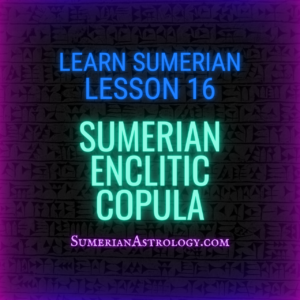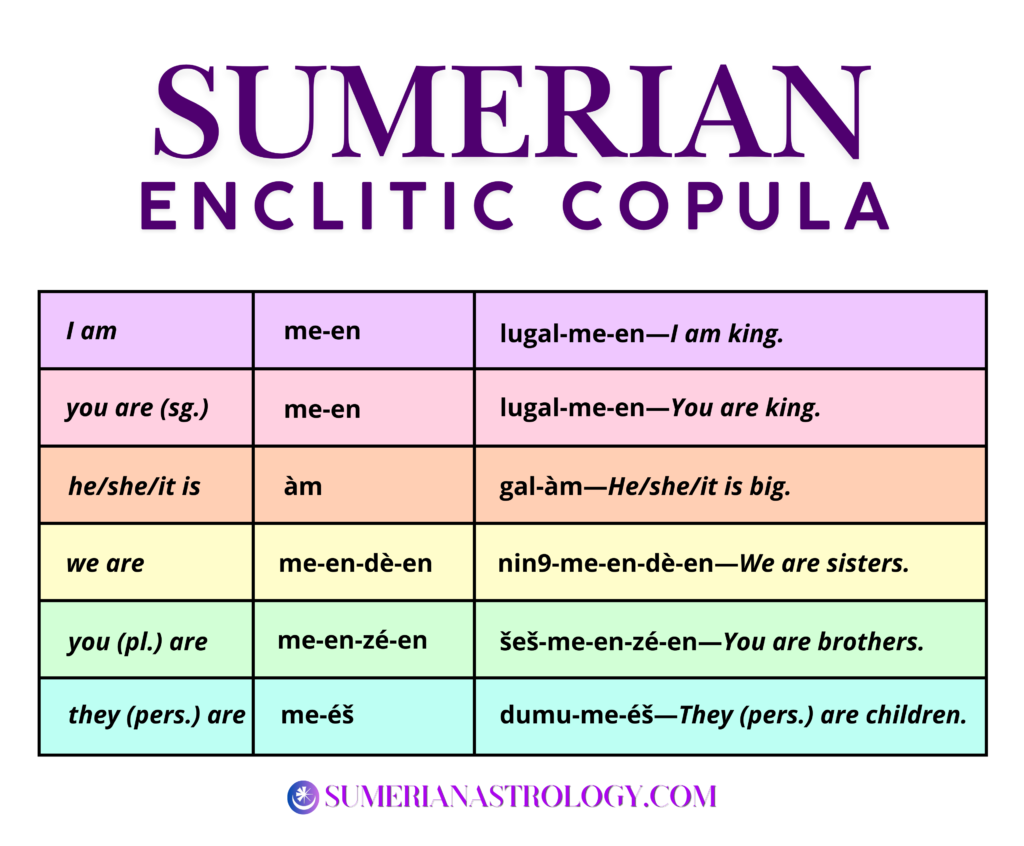Need a Refresher on Sumerian Verbs?
Helpful Terms
Here are some helpful terms you’ll encounter in this lesson. You can see a full list in the Glossary of Terms.
- copula: a verb that connects the subject of a sentence to a subject complement; often the word ‘was’, ‘is’, or ‘will be’.
- enclitic: a word that only occurs in combination with the preceding word.
- intransitive (trans.): a verb that doesn’t require a direct object to complete it’s meaning.
- perfective (perf.): In Sumerian, an aspect indicating actions which have been completed, or are fully expected to be completed in the future.
Vocabulary to Memorize
I highly recommend memorizing these Sumerian words, as you’ll encounter them often in the upcoming lessons!
- ĝál 𒉌𒅅 v., to exist; be (somewhere); to cause to be; to dwell.
- me-en 𒈨𒂗 cop., I am, you are (sg.).
- me-eš 𒈨𒂠 cop., they are (pl.).
- nin9 𒎐 n., sister.
- nu 𒉡 v., to not be. adv., no, not, without.
Vocabulary--Full List
Here are the vocabulary terms for this lesson. Be sure to look them over as they’re updated with additional meanings each lesson. You can see the full Sumerian Lexicon here.
- àm 𒀀𒀭 cop., he/she/it is.
- am6 𒀭 cop., he/she/it is (OS).
- dumu 𒌉 n., child, son, daughter.
- gal 𒃲 v., to be big, great, large, mighty. adj., big, great, large, mighty.
- ĝál 𒉌𒅅 v., to exist; be (somewhere); to cause to be; to dwell.
- ì 𒉌 n., butter, oil, fat, cream; oil container. part., stand-alone agentive prefix ‘I’; conjugational prefix (indicates distance from speaker).
- lugal 𒈗 n., king; owner, master, lord.
- me 𒈨 n., function, office, responsibility; divine power/decree. cop., I am (OS); you are (OS, NS); they are (NS). v., to say, tell. adv., where?
- me-en 𒈨𒂗 cop., I am, you are (sg.).
- me-en-dè-en 𒈨𒂗𒉈𒂗 cop., we are (pl.).
- me-en-zé-en 𒈨𒂗𒍢𒂗 cop., you are (pl.).
- me-eš 𒈨𒂠 cop., they are (pl.).
- me-eš 𒈨𒌍 cop., they are (OB).
- nin 𒎏 n., lady, mistress, owner, queen; lord (sometimes found in male names).
- nin9 𒎐 n., sister.
- nu 𒉡 v., to not be. adv., no, not, without.
- šeš 𒋀 n., brother; colleague; assistant.
- tur 𒌉 n., child; young; second [in rank]. v., to be/make small; to be insufficient; to reduce. adj., young, small, little.

The Verb ĜÁL 𒅅
There are two ways to express ‘to be’ in Sumerian. The first is with the verb ĝál 𒅅, which means to be present, or to exist, as in:
- ì-ĝál 𒉌𒅅 there is
- ì 𒉌 is a conjugational prefix which indicates distance from the speaker
- nu-ĝál 𒉡𒅅 there is not
- nu 𒉡 creates negation
The Verb ĜÁL 𒅅

A Few Things to Remember
- describes states (not actions)
- links subjects to descriptions or states (nouns to adjectives)
- is used in intransitive sentences (no action is passed from agent to patient)
- is used in the past or present perfective aspect (was/is/are)
- you’ll have to determine tense by the surrounding context
Your Sumerian Language Journey Continues!
In the next lesson, you’ll learn about independent personal pronouns, so be sure to subscribe to my substack to get all of my articles as soon as they post!










